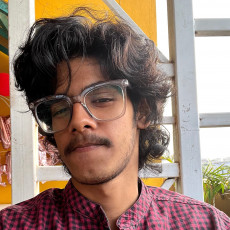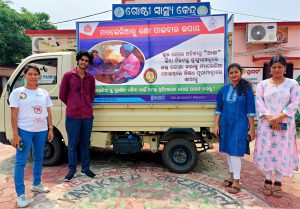Many tribal people in Odisha do not have access to formal education and this makes it harder to inform them about the risks associated with mosquitos. As a result, Jeeva Rekha Parisad must find a different vehicle – preferably one that unifies the entire community while also offering a narrative that will capture their imagination. That vehicle is the “Malaria Chariot.”
The chariot is a compact vehicle adorned with displays about Malaria, that include symptoms, methods of prevention, treatment options, and post-treatment care. These informative materials are presented in the local language, known as Odia, to ensure better understanding and accessibility.
As the chariot drives around the villages, people gather around to enjoy the exhibition, while at the same time learning about ways to combat malaria and other mosquito-borne diseases. People seem attentive and engaged as they digest the information on the chariot. They are contemplating how a tiny organism can be so dangerous and genuinely want some solutions.
By bringing people of all ages together under one roof, the malaria chariot also facilitates mass involvement. Those who are educated, especially schoolchildren, explain the chariot to those who are unable to read. This heightens the curiosity of their listeners and makes them determined to learn more. The chariot also gives us all a way to debunk misconceptions by providing evidence and using science. This invites follow-up questions from the audience, which are also met with rational responses.
Overall, the chariot has proved to be a colossal success and served as our main weapon in the fight against ignorance in the ten tribal villages. If our audience takes the message seriously, malaria can be beaten!
Posted By Rohit Samal
Posted Oct 12th, 2023


